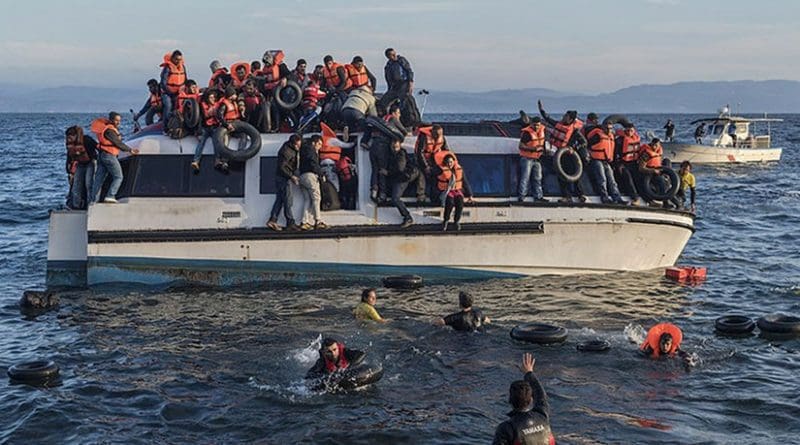EU And Turkey Seal Deal To Return Migrants
By Mariya Cheresheva
Greece will start sending new migrants back to Turkey from Sunday, European Union and Turkish leaders agreed in a deal intended to address the ongoing refugee crisis.
After two days of heated negotiations in Brussels, leaders from the EU and Turkey agreed on Friday on the controversial refugee deal aimed at stemming the refugee and migrant flow to Europe.
Under the terms of the agreement, Greece will start sending back migrants to Turkey from Sunday onwards.
“Turkey agreement was approved,” Finnish Prime Minister Juha Sipila was the first to announce on Twitter.
Turkish Prime Minister Ahmet Davutoglu hailed the agreement as “humanitarian”.
“We realise today that Turkey and the EU have the same destiny, the same challenges and the same future,” Davutoglu said after the meeting.
He said it would help discourage people-smuggling while encouraging legal migration.
“But without solving the Syrian crisis, we cannot be sure that these agreements will succeed,” he added.
The widely-criticised one-in-one-out principle, which decrees that for every Syrian refugee who has been sent back to Turkey, the EU will resettle another, is part of the deal that was agreed on Friday.
The relocation scheme however is capped at 72,000 people, who will be settled around Europe on a voluntary basis.
In return, the EU will grant visa-free travel to Turkish citizens as of June 2016 and will increase its financial aid to Turkey for managing the refugee crisis from three billion euros to six billion.
After complaints from Turkey that the process of handing over the previously-agreed three billion euros was too slow, the EU Council agreed that specific projects will be jointly identified with the European Commission within a week.
Brussels also promised to open another chapter in its negotiations with Ankara on EU membership by June this year.
The EU leaders managed to settle their differences on the refugee deal in the early hours of Friday.
Among the main hurdles was the four-decade-long dispute between Turkey and Cyprus, as a result of which Cypriot President Nicos Anastasiades had threatened to veto the agreement.
The other issue that the EU heads of state had to overcome was the questionable compliance of the plan with the international law, which had outraged some European lawyers and human rights groups.
Amnesty International put up a large screen outside the Brussels summit on Thursday with the message: “Don’t trade refugees. Stop the deal.”
Ahead of the summit, Lithuania’s president Dalia Grybauskaite warned that the deal was “on the edge of the international law”.
In order to answer those fears, the agreed text explicitly states that “on the issue of legality, the deal has to be in full compliance with EU law… and not create collective expulsions”.
EU member states also promised to provide Greece with border guards, asylum experts and interpreters “at short notice”.
Since the so-called Balkan Route was closed, around 45,000 migrants have been stranded in Greece.
Some 14,000 are living in squalid conditions at the Idomeni transit camp at the Greek-Macedonian border.
The summit also called for more support for the Western Balkan countries amid the refugee crisis and the European Investment Bank was asked to present a new initiative in June to provide extra money to support “sustainable growth, vital infrastructure and social cohesion”, Euractiv reported.

